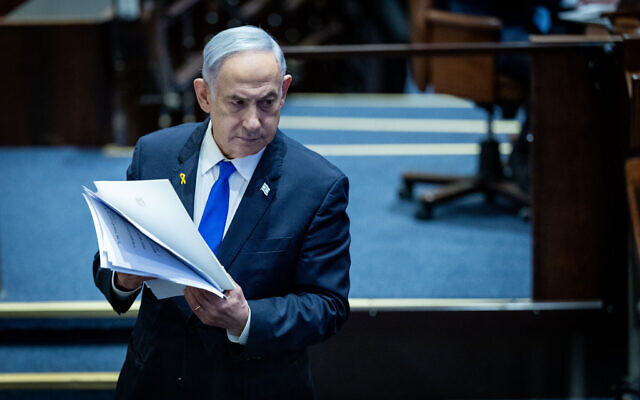‘Non-starter’: Netanyahu says no permanent Gaza ceasefire until Hamas destroyed
Lapid urges PM to accept deal outlined by Biden; promises safety net if far-right ministers bolt; hostage families say this could be last chance; Blinken briefs Saudis, UAE, Turks
Times of Israel
Jun 1, 2024

Prime Minister Benjamin Netanyahu said on Saturday there would be no “permanent ceasefire” in Gaza until Hamas’s military and governing capabilities were destroyed.
His comments, in a rare statement published on the Sabbath and only in English, came after United States President Joe Biden announced Friday that Israel had proposed a three-phase deal for a ceasefire in Gaza in exchange for Hamas releasing hostages, told the terror group to accept it and urged the Israeli government to stand behind it.
“Israel’s conditions for ending the war have not changed: The destruction of Hamas military and governing capabilities, the freeing of all hostages and ensuring that Gaza no longer poses a threat to Israel,” Netanyahu said.
“Israel will continue to insist these conditions are met before a permanent ceasefire is put in place. The notion that Israel will agree to a permanent ceasefire before these conditions are fulfilled is a non-starter,” he added.
Netanyahu’s comments, the second statement issued by his office in the hours after Biden’s speech, appeared aimed at framing the type of truce Israel would initially agree to, not definitively ruling one out.
In his address at the White House on Friday, Biden had spoken of reaching a complete ceasefire ahead of the first phase of the deal and then negotiating a “permanent end to hostilities” in the second phase. Hamas has been demanding an end to the war before it would resume talks.
Biden described the proposal as originating with Israel and laid out the details of a three-phase deal, with particular emphasis on the first phase, a six-week truce that could be extended if talks took longer. The deal, Biden revealed, had been submitted to Hamas on Thursday via Qatar, a mediator in negotiations to end the nearly eight-month war, which have faltered since April.
A US official later said the Israeli proposal was a highly detailed four-and-a-half-page document. It was apparently approved by the war cabinet — compromising Netanyahu, Defense Minister Yoav Gallant and minister Benny Gantz — but presumably not yet presented to the wider security cabinet, of which far-fight ministers Itamar Ben Gvir and Bezalel Smotrich are members, and on whose support Netanyahu depends for his coalition’s majority.
Immediately after the speech, Netanyahu — whom Biden avoided naming — released an initial statement saying that “The Israeli government is united in the desire to return our hostages as soon as possible and is working to achieve this goal.”
“Therefore, the prime minister authorized the negotiating team to present an outline for achieving this goal, while insisting that the war will not end until all of its goals are achieved, including the return of all our hostages and the elimination of Hamas’ military and governmental capabilities,” read the statement, adding that, “The exact outline proposed by Israel, including the conditional transition from stage to stage, allows Israel to maintain these principles.”
The premier’s statement, which omitted any direct reference to Biden’s speech, did not confirm whether the deal outlined by the US president was the same as the one proposed by Israel.
Opposition leader Yair Lapid on Saturday urged Netanyahu to heed Biden’s call for a Gaza truce and offered to support the government by ensuring its Knesset majority should far-right coalition partners bolt.
“The government of Israel cannot ignore President Biden’s consequential speech. There is a deal on the table and it should be made,” Lapid said in an X post.
“I remind Netanyahu that he has a safety net from us for a hostage-release deal if Ben Gvir and Smotrich leave the government.”
There was no immediate reaction to Biden’s proposal from hardliners Ben Gvir and Smotrich, with the announcement coming on the Jewish Sabbath.
Hostage families plead with all sides to take deal
Families of hostages held by the Hamas terror group also called for all parties to immediately accept Biden’s proposal to end the nearly 8-month-long war and bring their relatives home.
“We want to see people coming back from Gaza alive and soon,” Gili Roman told The Associated Press. His sister, Yarden Roman-Gat, was taken hostage and freed during a weeklong ceasefire in November, but Yarden’s sister-in-law, Carmel, is still being held.
“This might be the last chance to save lives. Therefore, the current state must be changed and we expect all to adhere to Biden’s call for accepting the deal on the table, immediately. There is no other way towards a better situation for all. Our leadership must not disappoint us. But mostly, all eyes should be on Hamas,” he said.
Many hostage families blame the government’s lack of will to secure a deal for the deaths of many of the hostages in captivity.
“We know that the government of Israel has done an awful lot to delay reaching a deal and that has cost the lives of many people who survived in captivity for weeks and weeks and months and months. Our hearts are broken by the amount of people we will receive that are no longer alive,” Sharone Lifshitz told AP.
Her mother Yocheved was released by Hamas in October, and her father Oded is still in captivity.
Hamas earlier on Saturday said it had a positive view of the proposal.
“Hamas confirms its readiness to deal positively and in a constructive manner with any proposal that is based on the permanent ceasefire and the full withdrawal [of Israeli forces] from the Gaza Strip, the reconstruction [of Gaza], and the return of the displaced to their places, along with the fulfillment of a genuine prisoner swap deal if the occupation clearly announces commitment to such deal,” the group said in a statement.
International support
US Secretary of State Antony Blinken proceeded to advocate for the deal in successive phone calls with Turkish Foreign Minister Hakan Fidan, Saudi Foreign Minister Prince Faisal bin Farhan al Saud and Jordanian Foreign Minister Ayman Safadi.
According to US State Department readouts, Blinken “underscored that the proposal is in the interests of both Israelis and Palestinians” in calls with the foreign ministers, all of whose governments are yet to officially respond to Biden’s speech.
However, other international leaders reacted favorably to the plan.
“The war in Gaza must end,” French President Emmanuel Macron wrote in both Hebrew and Arabic on social media. He also backed the plan announced by Biden, which he described as “the release of hostages, a sustainable ceasefire to work for peace and promote a two-state solution.”
German Foreign Minister Annalena Baerbock welcomed the proposal, saying that the offer “provides a glimpse of hope and a possible path out of the war’s deadlock.”
EU chief Ursula von der Leyen also expressed support for the proposal.
“I wholeheartedly agree with Biden that the latest proposal is a significant opportunity to move toward an end to war and civilian suffering in Gaza. This three-step approach is balanced and realistic. It now needs support from all parties,” the European Commission president said on social media.British Foreign Minister David Cameron also called on Hamas to accept the proposal.
“With a new hostage agreement on the table, Hamas must accept this deal so we can see a stop in the fighting, the hostages released and returned to their families and a flood of humanitarian aid into Gaza,” he wrote in a post on X.
He added that an extended ceasefire can be “turned into a permanent peace” if all parties are “prepared to take the right steps.”
“Let’s seize this moment and bring this conflict to an end.”
Indonesia offer
In a significant development, Indonesia’s president-elect, Prabowo Subianto, said on Saturday that his country was willing to send peacekeeping troops to enforce a ceasefire in Gaza if required.
Speaking at the Shangri-La Dialogue, Asia’s premier security conference, Prabowo, who won Indonesia’s March presidential election, said the proposal presented by Biden was a step in the right direction.
“When needed and when requested by the United Nations, we are prepared to contribute significant peacekeeping forces to maintain and monitor this prospective ceasefire as well as providing protection and security to all parties and to all sides,” Prabowo said.
Other Arab and Muslim nations who maintain ties and contacts with Israel have so far largely balked at committing to sending troops to a post-war-Gaza.

The 72-year-old former special forces general and current Indonesian defense minister will in October assume the presidency of the world’s most populous Muslim, which does not have official diplomatic relations with Israel.
In April, it was reported that Indonesia would recognize Israel in return for accession to the OECD, which requires the unanimous approval of member states, including Israel. The day before, Indonesia had participated in a 10-country airdrop of humanitarian aid into the Gaza Strip, which required Jerusalem’s preapproval for Jakarta’s planes to enter Israeli airspace.
Prabowo also said current Indonesian President Joko Widodo had instructed him to announce that Indonesia was also ready “to evacuate, to receive and to treat with medical care up to 1,000 patients” from Gaza.
The Indonesia Hospital in Gaza, which was run by an Indonesia NGO, closed in November amid the fighting.
Prabowo said a comprehensive investigation into the humanitarian disaster in the Rafah area of Gaza was needed as well as a “just solution” for the region.
“And that means the rights of not only Israel to exist, but also the rights of the Palestinian people to have their own homeland, their own state, living in peace.”

No comments:
Post a Comment